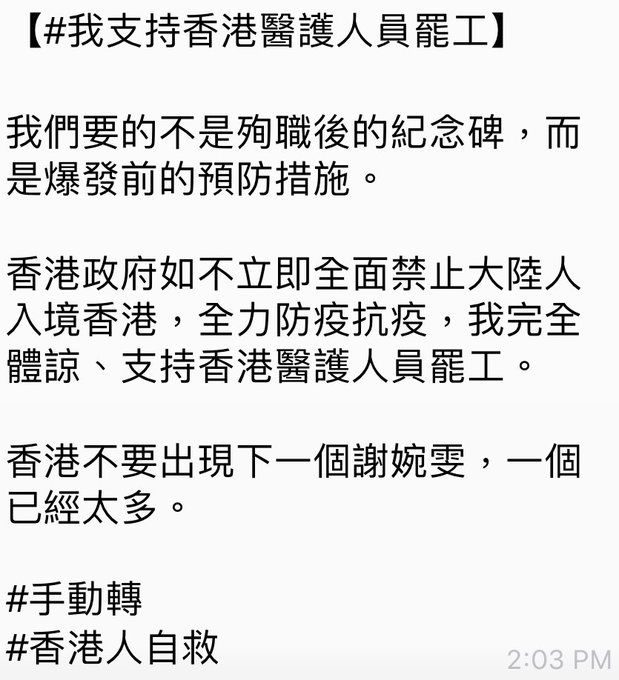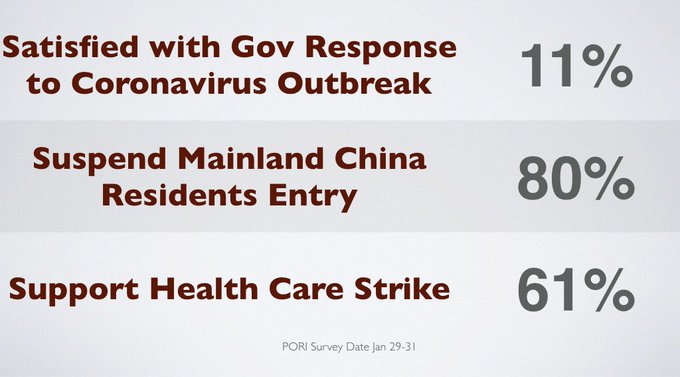Benjamin So is a 27-year-old doctor in Hong Kong. He usually works in the internal medicine department of Queen Mary Hospital, located on the southern coast of the city with sweeping views of the South China Sea. Right now, however, he’s holed up in a hotel room nearby in self-imposed quarantine—and preparing for a strike.
The coronavirus epidemic is unfolding in Hong Kong at a volatile time. After months of large-scale protests, public trust in the government is at historic lows and societal divisions at record highs. Yet the current public health crisis may well transcend political divides and unite Hong Kongers in their shared anger at the perceived incompetence of the government.
Earlier this week, during his shift working in the isolation ward, So admitted two elderly patients who had travelled to Hong Kong from Wuhan. The couple were later confirmed to be infected with the novel coronavirus, which has now infected almost 10,000 people in China and killed 213. Hong Kong has 12 confirmed cases of the coronavirus.
This left So with a question: should he be quarantined, given his direct contact with two confirmed cases, or was he expected to return to work the next day? Hospital management, So said, told him that he would not need to isolate himself, because he had been in protective gear when dealing with the patients. So found this decision “bizarre,” because there was no way of ruling out any chance of contamination. Returning to work as usual, he thought, would only put other patients and colleagues at risk.
That’s how So decided to check himself into a hotel room for at least two weeks, paying out of his own pocket for accommodation. Though management later told him that the hospital can make available 21 isolation rooms on site for medical personnel, he felt that this would still be insufficient in the event of a full-blown outbreak in Hong Kong.
“I would say the Hospital Authority has been quite slow in responding to this outbreak and they haven’t had clear contingency plans…it shows how limited our resources are,” said So, referring to the government body that manages the city’s hospitals. “If a full community outbreak does happen there’s no way our medical system can deal with that.”
Now he’s spending his time in isolation, drafting statements and petitions calling for a medical strike. More than 6,500 nurses and doctors have already pledged to strike unless the government meets their demands, foremost of which is the complete closure of all 14 border control points with mainland China in order to stem the coronavirus outbreak. On Tuesday (Jan. 28), Hong Kong chief executive Carrie Lam ordered a partial closure of the border, but the measure was widely panned as ineffective because only about 10% of mainland Chinese visitors come through the ports of entry being shut.
To many, the Hong Kong government appears unable to make its own decisions without first deferring to Beijing. When Lam announced travel restrictions for mainland Chinese visitors this week, it was presented not as Hong Kong barring entry to mainlanders, but as China suspending the issuance of individual tourist visas. When the chief secretary addressed concerns about the shortage of surgical masks, he said he had asked China to allow imports of masks into Hong Kong. And with the government’s continued refusal to close the border with China despite polling showing overwhelming public support for the measure, people are again wondering whether officials truly have the public’s interests at heart. Lam doubled down on her decision at another news conference today, arguing that measures to close the border would “stigmatize” mainland Chinese.
“No one is asking for the border to be closed permanently,” So said. “What we’re asking for is in the interim… there’s a need to very firmly tighten up border controls so that we can limit the number of further imported cases.” And while the government has already banned entry to Hong Kong for people from Hubei province, the outbreak’s epicenter, So says this is “nowhere near enough” as the coronavirus has already spread throughout China.
Already, some 90 nurses at three hospitals called in sick earlier this week to sound the alarm ahead of the strike.“They were very concerned about the quality of our facilities and that they wouldn’t be able to protect themselves or our patients,” he said of the nurses. But he also understands that calling for medical professionals to strike can be morally fraught. The Hong Kong Public Doctors’ Association, for one, has said it would not take part in the strike.
The Hospital Authority Employees’ Alliance, a newly formed union that grew out of the protest movement and that is organizing the industrial action, will vote tomorrow on whether to go on strike. The continuing resistance movement, So said, has galvanized support for protest actions like strikes.
“The incentive for health care workers to go on strike is very low, there’s a lot of moral baggage we’re carrying,” So said. “But if this is the only way to force the government to take real policy action, then this is what we have to do.” He said that friends and family are also supportive of the strike because “they understand this is the last resort to force the government to take action to stop the outbreak from happening.”




No comments:
Post a Comment